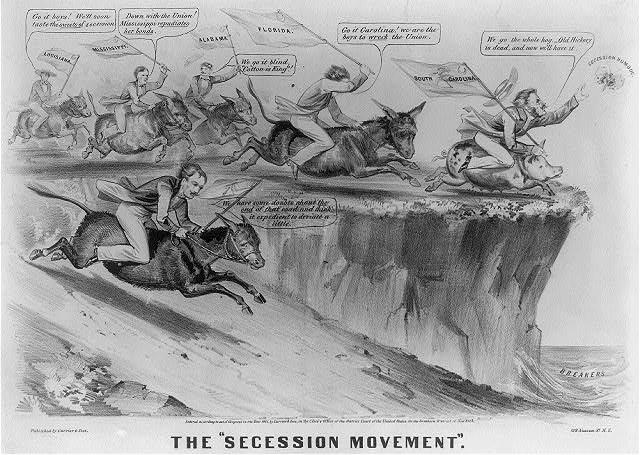Secession political cartoon
A political cartoon, drawn circa 1861, depicts southern secession. The cartoon shows Florida, Alabama, Mississippi, and Louisiana as men riding donkeys, following South Carolina's lead toward a cliff. The rider carrying the Georgia flag rides down a hill, saying, "We have some doubts about 'the end' of that road and think it expedient to deviate a little."
South Carolina rides a pig and reaches a butterfly "Secession Humbug," saying, "We go the whole hog. -- Old Hickory [Andrew Jackson] is dead, and now we'll have it." Florida, just behind South Carolina, shouts, "Go it Carolina! we are the boys to 'wreck' the Union." Next follows Alabama, who declares, "We go it blind, Cotton is King!'" Mississippi says, "Down with the Union! Missippi 'repudiates her bonds.'" The last rider is Louisiana, who says, "Go it boys! We'll soon taste the 'sweets' of secession," a reference to the state's domination of the sugar trade.
The reference to Jackson refers to the nullification crisis of the 1830s, in which South Carolina threatened to secede if President Jackson tried to enforce federal tariffs in the state.

Public Domain
Public Domain is a copyright term that is often used when talking about copyright for creative works. Under U.S. copyright law, individual items that are in the public domain are items that are no longer protected by copyright law. This means that you do not need to request permission to re-use, re-publish or even change a copy of the item. Items enter the public domain under U.S. copyright law for a number of reasons: the original copyright may have expired; the item was created by the U.S. Federal Government or other governmental entity that views the things it creates as in the public domain; the work was never protected by copyright for some other reason related to how it was produced (for example, it was a speech that wasn't written down or recorded); or the work doesn't have enough originality to make it eligible for copyright protection.
Add a comment
PLEASE NOTE: NCpedia provides the comments feature as a way for viewers to engage with the resources. Comments are not published until reviewed by NCpedia editors at the State Library of NC, and the editors reserve the right to not publish any comment submitted that is considered inappropriate for this resource. NCpedia will not publish personal contact information in comments, questions, or responses. If you would like a reply by email, note that some email servers, such as public school accounts, are blocked from accepting messages from outside email servers or domains. If you prefer not to leave an email address, check back at your NCpedia comment for a reply. Please allow one business day for replies from NCpedia. Complete guidelines are available at https://ncpedia.org/about.